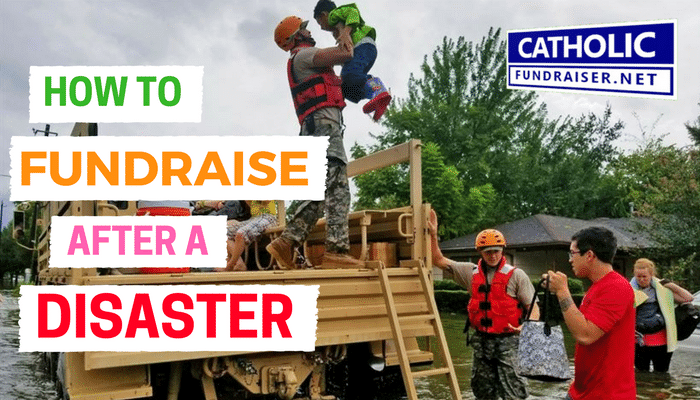Most of us start with the idea that to raise funds we have to find donors all the time. Therefore, the hunt begins, and the fundraising strategy focuses on finding people and getting them to donate. Sounds like a logical approach to reach your target, but in fact, it’s not at all.
If you are fundraising like this, you’re running up a steep mountain, and in no time, you’ll run out of breath.
Fact: to find donors is difficult, and asking people for money is nauseating.
Well, it is for me, especially when the idioms we use when fundraising are: ‘it is better to give than receive’ and ‘God likes a joyful giver.’
How awful to say these lines every day in hope that people will send us gifts?
My response to this kind of fundraising is if it’s so great to give, why then are charities always asking? Why are they not giving more to Catholics, prospects, and their donors? Sure, I do not argue that they are doing wonderful work through their mission, but to those they ask for donations, charities lean heavily on the receiving end. In my view, that puts them at risk of capsizing the boat.
I think this constant asking for money puts you, the fundraiser, in an awkward situation. I applaud you for using the funds to help others, but is that enough to inspire Catholics to donate to them? I don’t think so, and I have a better approach. My view is that it’s better for everyone to give, especially charities.
To find donors, shock Catholics by giving more to them (even before you ask)
My approach to fundraising is heavily influenced by the concept, ‘it is better to give than to receive.’ This is challenging for us fundraisers because our job is to collect donations. But just because something is a paradox doesn’t mean it’s not true. If anything, the truth is hidden within what looks complex. You just have to keep looking.
This concept of giving to your Catholics (especially your current donors) has everything to do with fundraising because more donations don’t always come from finding new people. In fact, the majority of donations will come from the people whom you already know.
You just have to look more closely.
Just because you meet someone, explain what you do, and they don’t give, doesn’t mean they will never be a donor. In fact, you have more chances of them becoming a donor than repeatedly asking new people.
Donors are people who recognize the importance of what you do. They have similar values to you. They have a similar vision. They see your plan for doing good as a way forward. Therefore, the way to find donors is to take a step back and first find people who share your passion, share this with them as often as possible, and don’t drop the relationship just because you didn’t score a donation.
Donations happen when you take the time to build relationships with Catholics.
Check out my article on the Generosity Factor for more ways of shocking Catholics with your new approach to fundraising.

The #1 factor why you aren’t getting more donors
This is the where most Catholic charities fail. They find a group of Catholics who have a general interest in their work and immediately ask. If the response is “no thank you”, the charity forgets about them and goes looking for another group (or parish) to ask.
This becomes a never-ending cycle of finding and asking.
I think this is wrong because you associate your relationship with someone on whether or not they immediately give. I’m going to assume that, as a fellow Catholic, you see the fault here. We as Catholics don’t base our relationships on what we can get out of others.
That’s utilitarianism.
Utilitarianism is a civilization of production and of use, a civilization of “things” and not of “persons”, a civilization in which persons are used in the same way as things are used. – Pope John Paul II, Letter to Families, 1994
We as Catholics are to base our relationships on the dignity of the other person. We focus on willing the good of the other.
Check out my article on the fantastic book: Why Catholics Don’t Give … and What to Do About it.
Why long-term relationships equals more donors
Your number one priority to increase your number of donors is retention. Retention is keeping a donor year after year. Most Catholic organizations don’t look at retention, and that’s why each year they are frantically looking for donors to reach their end of year target.
They have no idea how many of last year donors gave this year. They don’t know why they stopped giving. They don’t know why they continue to give.
In fact, they don’t know much at all about their donors. These are serious problems that must be resolved quickly.
You have to switch to a different approach to your donors. With the technology that we have today, there’s no reason you cannot contact each one individually and get to know them.
Email costs nothing.
Phone calls cost very little.
All you have to do is manage your list of donors. That’s it.
Will it require some time and effort on your side? Absolutely. But the return on receiving long-term sustainable funds is exponential. I know no better way to increase your funds than this way. As you keep more of your current donors, you spend more time to find donors that help you grow rather than just replace donors that leave.
So the question is: do you know the percentage of last year’s donors who are giving this year? If you don’t, or if it takes you a while to find it, I recommend you start accessing this information more quickly.
Take a minute to read my article on how to inspire Catholics to give more financially.
Example: I’m not lying. Check the numbers for yourself!
To show you how important retention is, let’s do the math. For every one donor that stops donating, you have to find two just to increase your number of donors. So if you have 100 donors, and 50 stop giving, you have to find another 100 to increase your donors to 150.
This means you spend 50% of your time getting back to your original number of 100 donors, and the other 50% of your time growing your number of donors to 150.
That’s pretty inefficient.
It is a lot more work to find new donors than it is to keep the ones you have. Therefore, we can assume you are spending about 75% of your time looking for 50 donors to replace the ones you lost, and 25% of your time actually looking for ones to increase your fundraising level. This is why I said in the beginning that if you are just looking for new donors, you are climbing up a mountain and this strategy is exhausting. Instead, focus on who God has already given you.
Consider this Catholic approach to relating with your donors
My recommendation is to focus your time on your current donors. Build relationships with them. Learn who they are. Thank them often. Listen to them. Find ways to get them more involved than just financially.
When you make every effort to keep your donors, you don’t have to find two new donors to grow. Therefore, you can spend more time to find donors.
You just have to find one after another. That’s much easier to do.
The Catholic way of developing relationships with donors and increasing your donor base requires more prayer, more attention to the person, and more willingness to depart from the formalities of conventional fundraising.
Pray – Take a piece of paper, separate it into 12 columns, one for each month, and reflect on how you can express your gratitude to your donors each month. How can you say thank you without attaching a donation request to your message?
Pray – Whether it’s offering Mass for your donors, saying a rosary, or praying for them at adoration, find your ways to bless them. Also, tell them that you are doing it. Share with your donors the different activities you do for them. Have them get involved.
Pray – I also recommend that you intercede for your donors. The best way to do this is by asking them for feedback and doing small tasks for them. Ask, “how can I better serve you and thank you for your generosity?” Then, take action.
Ask – Ask your donors to stay donors. Keep track of your retention. Follow-up with each donor. Track when their year anniversary of donating is coming up and reach out to them in advance. Let them know how thankful you will be if they continued giving. Then start looking for more donors, as you will have more energy and time to do so.
Question: How long does it take you to find your retention rate?




